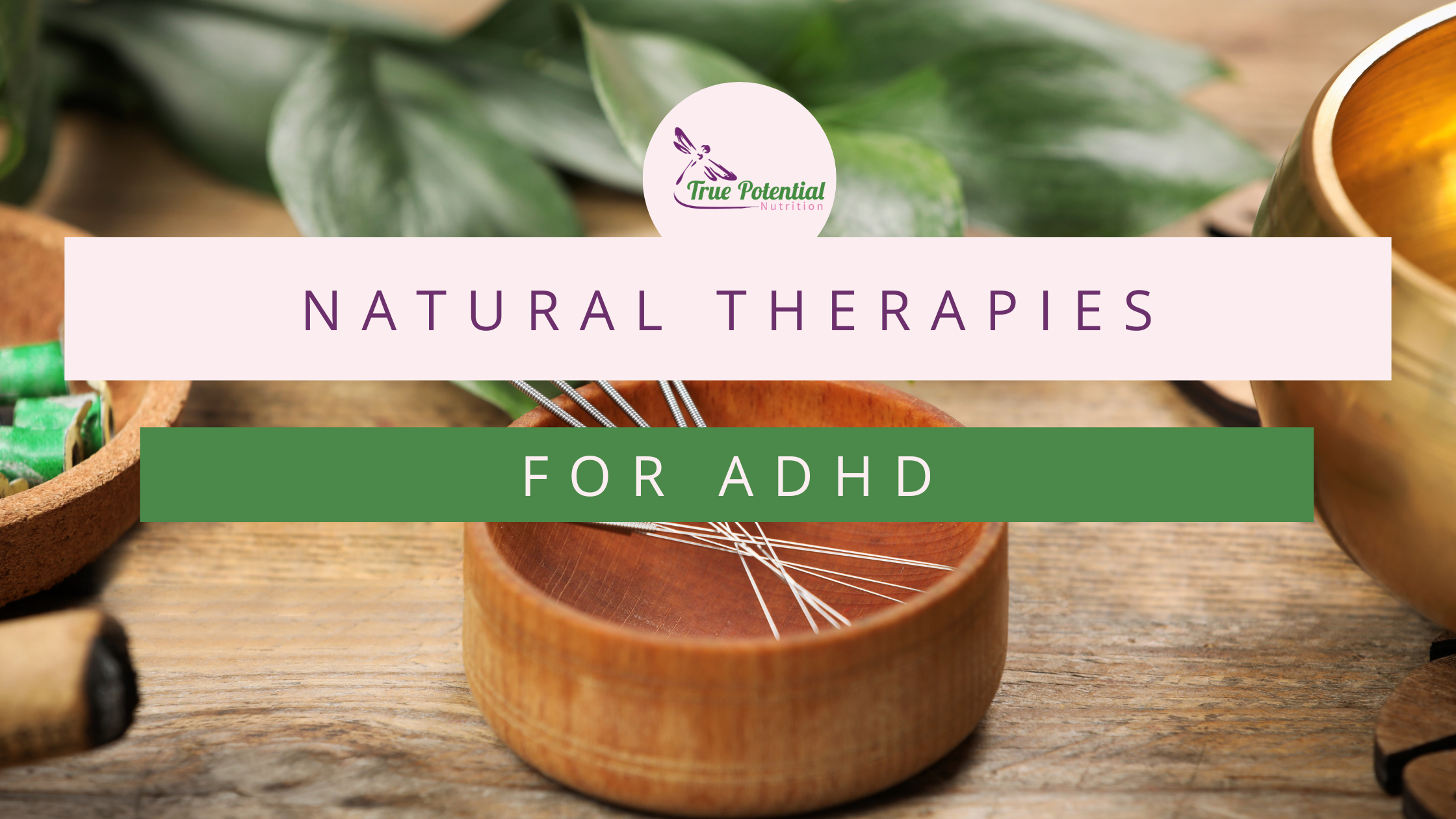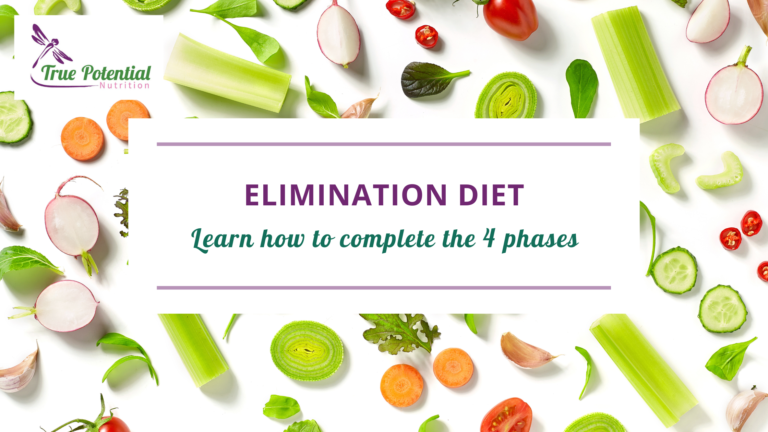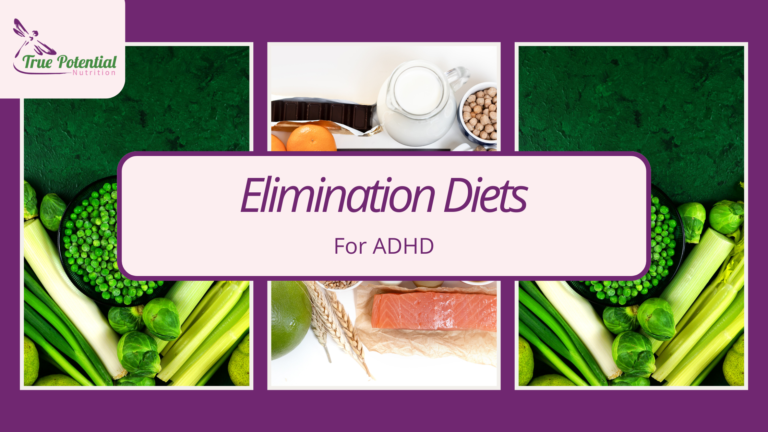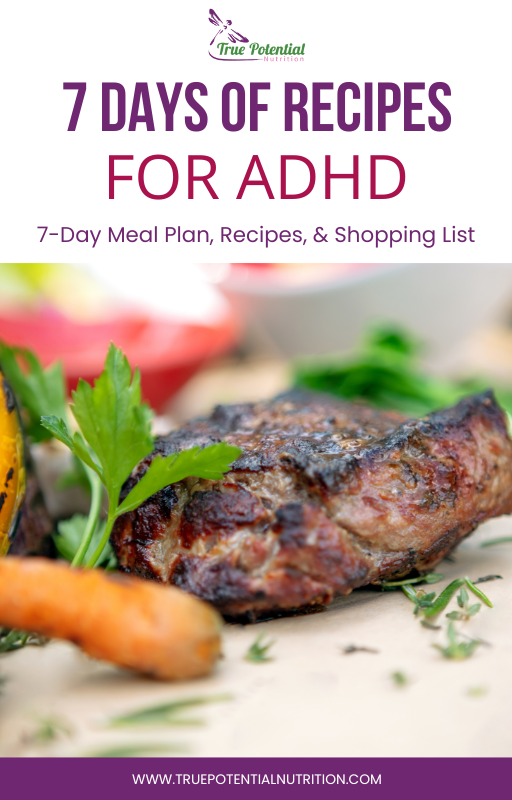By Danielle MacDowell M.S.,BCBA,M.Ed.

Main Takeaways
- Natural therapies are gaining traction and popularity within the Attention-Deficit Hyperactivity Disorder (ADHD) community.
- Attention-Deficit Hyperactivity Disorder (ADHD) is a neurodevelopmental disorder characterized by inattention and hyperactivity.
- Conventional methods for treating ADHD include behavior therapy and medication.
- ADHD medications fall into 2 categories: stimulants and non-stimulants. Both types of medications can impact appetite and cause side effects.
- Twenty to thirty percent of people who take ADHD medication either cannot tolerate the medication due to the side effects or do not respond to the medication.
- The lack of tolerance and responsiveness to medications has led people to seek out natural therapies for ADHD.
- There are several natural treatments that have been shown to positively impact ADHD symptoms.
- Elimination diets are sometimes utilized to reduce symptoms of ADHD. The Few Foods Diet (FFD) and The Feingold Diet (FG) have shown the most promise in terms of ADHD symptoms.
- Sugar continues to be a hotly debated topic in the ADHD world. At this point, there is no conclusive evidence showing that sugar causes ADHD or ADHD symptoms.
Table of Contents
Attention-Deficit Hyperactivity Disorder (ADHD) is a neurodevelopmental disorder characterized by inattention and hyperactivity. According to the CDC,[1] individuals with ADHD may have difficulty remembering, controlling impulses, sitting still and being silent for extended periods of time. These manifestations can result in difficulties in school, home, and social circles.
The prevalence of ADHD is on the rise and has been for sometime now.[2] It is unclear as to whether more individuals actually have ADHD or diagnostics have improved. Regardless, important discussions need to be had to best support individuals with ADHD.
Considering the increase in diagnoses and the impact that ADHD symptoms can have on one’s quality of life, concerted efforts are being made in the research community, the education setting, the holistic space, and the medical field to identify ways to lessen the symptoms of ADHD.
With this increased knowledge about various ways to reduce ADHD symptoms, natural therapies are gaining traction and popularity within the ADHD community.
Conventional ADHD Treatments
Conventional treatment for ADHD typically includes a combination of behavior therapy and medication. Behavior therapy is often the “first line of treatment” in children under 6. [3] Behavior therapy will also likely be recommended in children over 6-years old. However, medication may be suggested in conjunction with the behavior therapy.
Behavior Therapy
Behavior therapy is used to increase pro-social behaviors while simultaneously reducing challenging behaviors. Behavior therapy works best when it combines parent training with direct therapy, as this approach gives both parents and children the tools they need to be successful. Behavior therapy can take place across environments, including the school setting. Service delivery across settings can be particularly advantageous, as it teaches a child how to get his/her needs met in a variety of environments.
ADHD Medications
As mentioned above, behavior therapy is the first line of treatment. However, some individuals need additional supports, including medication, to get symptoms under control. The goal of medication is to improve overall executive functioning.
There are two key neurotransmitters involved in executive functioning: dopamine and norepinephrine. These two neurotransmitters play a role in attention, executive functioning, and impulse control. For these reasons, these two neurotransmitters have been a focal point in ADHD literature and the target of ADHD medications.
Research has demonstrated that medications used to increase dopamine and norepinephrine can reduce ADHD symptoms. In fact, 70-80% of patients prescribed these medications have a reduction in symptoms.[4]
ADHD Medication Side Effects
ADHD medications have been shown to be effective at increasing attention, executive functioning, and impulse control. While these medications can be effective at managing ADHD symptoms, they can also cause side effects.
Side effects of ADHD medications include:
- Poor appetite
- Trouble sleeping
- Stomach irritation
- Changes in mood
- Headaches
- Increased heart rate
- High blood pressure [5]
Natural Therapies for ADHD
While ADHD medications have proven efficacy in a large proportion of people, there are still a subset of individuals who do not respond favorably. In fact, 20-30% of people who take these medications either cannot tolerate the medication due to the side effects or do not respond to the medication. This lack of tolerance and responsiveness has led people to seek out natural therapies to manage ADHD symptoms.
The desire to seek out natural therapies for ADHD is not an uncommon one. One study reported that sixty-four percent of children with ADHD have tried at least one alternative treatment (i.e. diet, supplement, etc,) to reduce symptoms.[2]
There are several natural therapies that have been studied as either an adjunct or an alternative to medication, including:
- Fish Oil
- Phosphatidylserine
- Ginkgo Biloba
- Panax Ginseng
- L-carnitine
- Saffron
- L-theanine
- Acupuncture
- Neurofeedback
- Meditation
- Elimination Diets
- Nutrient repletion
The above alternative therapies have shown small to moderate improvements in ADHD symptoms. However, more studies need to be conducted to determine the cumulative effect of multiple natural treatments on ADHD.
ADHD, Diet and Nutrition
We know that there are strong genetic underpinnings to ADHD. However, the exact pathophysiology is not fully understood. That being said, nutritional factors, such as deficiencies and environmental factors, such as allergies, have been hypothesized to play a role in ADHD symptoms.
Nutritional Deficiencies and ADHD
Nutritional deficiencies can greatly interfere with the brain’s ability to function properly. Not only does the brain require enough energy to perform well, it also requires adequate nutrients to synthesize neurotransmitters and to provide the brain with protection against damage, amongst other things. Fatty acids, B vitamins, magnesium, iron, and zinc are the primary nutrient players in brain health. So, it is no wonder that deficiency in any of these nutrients can hinder the brain’s ability to function optimally.
Given the critical impact that nutrition has on brain health, it has been hypothesized that by correcting nutritional imbalances, the brain can better perform in the way it is meant to, and subsequently ameliorate ADHD symptoms. And, in fact, research has documented that by correcting nutritional deficiencies, behavior, mental performance, and mood can improve. For example, when repleting iron in the presence of an iron deficiency, behaviors and mental performance have been shown to get better.[6] Similiarly, correcting zinc and magnesium deficiencies have also shown improvements in mood and behavior.[6]
5 Foods to Support Brain Health in ADHD
By correcting nutritional imbalances, the brain is better equipped to perform in the way that it is meant to, and, in turn ADHD symptoms may improve. There are some key foods that may optimize brain functioning due to their rich-nutrient profile, and therefore may support ADHD. These foods include oysters, red meat, pumpkin seeds, avocado, and salmon.
1.Oysters
Oysters have high zinc content, which is critical in brain development. Zinc plays an important role in“protein binding, enzyme activity, and neurotransmission.”[7] Beyond its well-documented functions in the brain, low levels of zinc have been association with ADHD. What’s more, is that there is a linear correlation between the severity of the zinc deficiency and the severity of the ADHD symptoms. [7]
2. Red Meat
Red meat is high in iron, which is needed to maintain both the structure and the function of the central nervous system. It plays a role in neurotransmission and neurotransmitter synthesis (e.g. serotonin, dopamine). Similar to zinc, lower iron levels have been shown to exacerbate ADHD symptoms.
- Real World Tip: Eating red meat with vitamin-C rich foods increases absorption of iron. Foods containing vitamin C include peppers, broccoli, strawberries, kiwi, avocado, potato, and brussel sprouts.
3. Pumpkin Seeds:
Pumpkin seeds are high in magnesium. Magnesium deficiency is a common problem amongst individuals in the United States. Individuals with ADHD may have an even higher likelihood of being deficient in magnesium when compared with the general public. [7] In a small clinical study analyzing the effects of 200 mg/day of magnesium on ADHD symptoms, researchers found “significant reductions in hyperactivity” and reduced distractibility. [7]
4. & 5: Avocado & Salmon:
Avocado and salmon contain high amounts of polyunsaturated fatty acids (PUFA), which play a critical role in brain health, as they help modulate inflammation, neurotransmission, and cellular survival. [8]
In a meta-analysis analyzing the effects of supplemental omega-3 fatty acids on 699 children with ADHD, researchers found that omega-3 fatty acids had “small but significant” effects on symptoms. [9] While salmon and avocado do not contain as much PUFA needed to confer therapeutic benefits related to ADHD, regularly eating foods containing PUFA can assist with overall brain health.
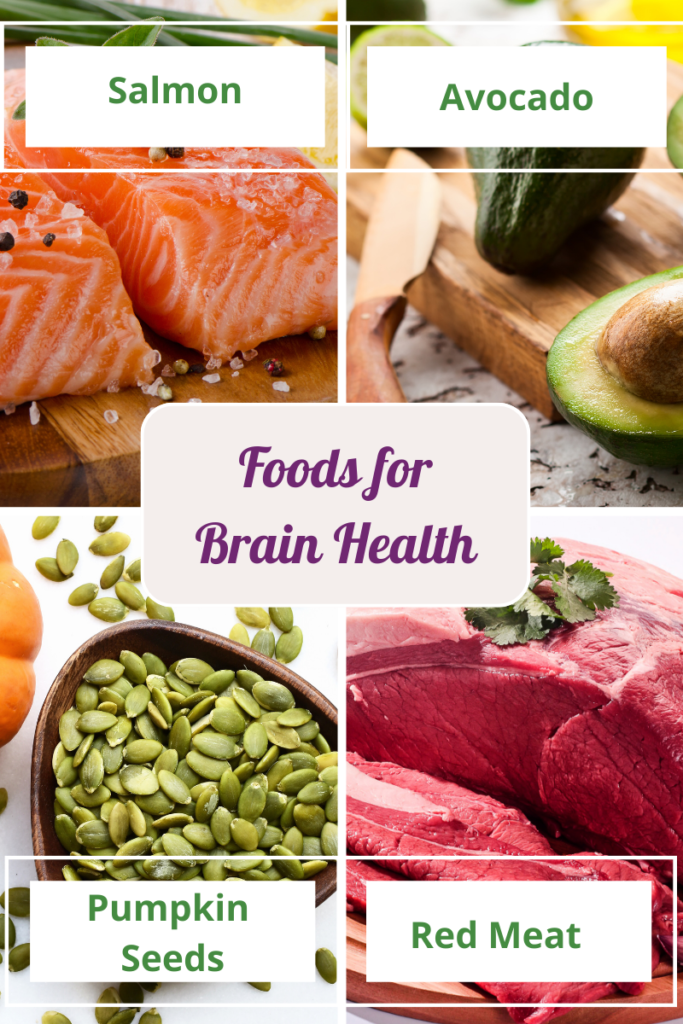
Fish Oil and ADHD
Fish oil is one of the most well-researched supplements in the ADHD world, and for good reason. Fish oil contains 2 important omega-3 fatty acids: Docosahexaenoic acid (DHA) and Eicosapentaenoic acid (EPA). DHA and EPA are both potent anti-inflammatory agents and play an important role in brain health. DHA, in particular, is known for it’s role in brain health.
Sixty percent of the brain is made up of fat, with the preponderance of it coming from DHA. DHA has long been recognized for its importance in brain development. However, we now are beginning to understand its utility in maintaining brain functioning and neuronal protection. With this in mind, it is no wonder that DHA may also be advantageous in individuals with ADHD. Both EPA and DHA have demonstrated improvement in ADHD symptoms, however, DHA appears to be the more efficacious of the two fatty acids.[10]
How to Supplement with Fish Oil for ADHD
While obtaining our nutrients from whole foods is often the best approach, some people are not able to consume fish. This is where supplementation can come in handy. That being said, if you have decided to go the supplemental route, it is important to utilize high quality brands. You can discern a “high quality” from a low quality brand by paying attention to the label.
High quality brands typically include the following on their labels:
- Wild-Caught
- Sustainably-Sourced
- Third-Party Tested
In addition to the recommendations above, if you are interested in using fish oil for ADHD, look for a supplement with a minimum of 300 mg DHA in order to get the therapeutic response that you are looking for.[10] And, as always, if you are going to be making any supplemental or dietary changes, speak with your healthcare provier beforehand.
ADHD and Elimination Diets
Elimination Diets
The role of food allergens in ADHD etiology has been questioned, which is why there are several studies examining the impact of elimination diets on ADHD symptoms.
Elimination diets are specialized diets that can be used as a tool to identify symptom-causing foods. This is done by eliminating suspected foods from one’s diet.
There are several variations of elimination diets, most of which restrict consumption of the top 8 allergens, including:
- Gluten
- Corn
- Dairy
- Eggs
- Tree nuts
- Shellfish
- Soy
- Peanuts.
While many elimination diets focus on eliminating the top 8 allergens, some diets are more restrictive, as is the case in the Few Foods Diet (FFD), and some are less restrictive, as is the case with the gluten-free and casein-free (GFCF) diet.
Elimination Diets and ADHD
When discussing ADHD, two variations of the elimination diet are at the forefront of the conversation:
- The oligoantigenic diet (aka few foods diet)
- The Feingold diet (FG)
The few foods diet (FFD) consists of foods with “low allergenic potential” while the FG eliminates all foods that contain artificial food coloring and additives. Although both of these diets have been front and center of nutritional research for ADHD, the FFD seems to be more promising. A number of studies have demonstrated a decrease in ADHD symptoms when on the few foods diet.[11-13] That being said, the FFD is also incredibly restrictive. And any restrictive diet comes with its own set of challenges, including difficulty adhering to the diet and maintaining adequate nutrition.
As far as the FG diet, the research is quite interesting. Some research shows that the removal of artificial dyes and additives may only marginally impact ADHD symptoms. Other research shows more promise; some studies demonstrate that the FG can be effective at reducing ADHD-associated symptoms in individuals with and without ADHD.[13-14] So, it appears that everyone can benefit from a reduction in dyes and additives, regardless of an ADHD diagnosis. The easiest way to do this is by prioritizing whole foods.
Sugar and ADHD
I would be remiss if I did not mention sugar when speaking about ADHD. Sugar has been a hotly debated topic in the ADHD sphere for decades, and rightfully so. However, believe it or not, scientific literature does not show any causation between sugar consumption and ADHD.[13]
This information is kind of unbelievable, right?
After all, we have all been to a party where we have witnessed the child “bouncing off the walls” after eating handfuls of candy. This observation, or similiar observations, make this data difficult to comprehend. The confusion and disbelief is completely understandable.
The challenge in proving that sugar is the cause of the ADHD symptoms is due to the many confounding factors present when a child consumes sugar. Some of these confounding factors include the environment and other food compounds (e.g. dyes and food additives).
For example, often, when a child is eating a lot of sugar there is a party involved. The party in of itself offers a lot of confounding variables, which has caused researchers to further question the assumed association between sugar and ADHD symptoms. Some questions that researchers are asking include:
- Is the child extra excitable because they are at a party or because they are eating cake
- Are there other food compounds (e.g. gluten, dyes) that could be contributing to the ADHD symptoms?
The reality of the situation is that the environment, other food components, and sugar may all increase the risk of ADHD symptoms, which makes it hard to definitively cast blame on sugar as a sole cause of ADHD symptoms.
So, does this mean that we can conclusively state that sugar does not have any impact on ADHD symptoms? Absolutely not. At this time, we can only say that there is no evidence that sugar is the cause of ADHD and ADHD symptoms.
While there is no bulletproof argument that sugar causes ADHD, we do know that excess consumption of sugar invariably wreaks havoc on the body. It is important to remember that individuals who consume too much sugar “have a higher risk of obesity, type 2 diabetes mellitus, dyslipidemia, hypertension, and cardiovascular disease.”[15] So, regardless of its impact on ADHD, sugar intake should always be moderated.
Final Thoughts and Main Takeaways
Between the increase in prevalence of ADHD, the impact that symptoms can have on one’s quality of life, and the side effects that medications can exert, concerted efforts are being made in the research community, education setting, the holistic space, and the medical field to identify ways to lessen the symptoms of ADHD. Several natural therapies, including nutrient repletion, supplementation, stress management, and diet have been identified and supported in the literature to improve ADHD symptoms. However, at this point, they are only showing small-moderate improvements in symptoms. That being said, more studies need to be conducted to determine the cumulative effect of multiple natural therapies on ADHD.
*As always, if you are considering making any changes to medications, supplements, diet, or lifestyle, reach out to your practitioner so that they can guide you through the process.
- Center for Disease Control. What is ADHD? https://www.cdc.gov/ncbddd/adhd/facts.html. Updated on August 9, 2022. Accessed on August 15, 2023.
- Brown J. Nutrition Through the Life Cycle (Edition 7). Boston, Massachusetts: Cengage; 2020.
- Center for Disease Control. Treatment of ADHD. https://www.cdc.gov/ncbddd/adhd/treatment.html. Updated on August 9, 2022. Accessed on August 15, 2023.
- Kolar D, Keller A, Golfinopoulos M, Cumyn L, Syer C, Hechtman L. Treatment of adults with attention-deficit/hyperactivity disorder. Neuropsychiatr Dis Treat. 2008;4(2):389-403. doi:10.2147/ndt.s6985.
- Cleveland Clinic. ADHD Medications. https://my.clevelandclinic.org/health/treatments/11766-adhd-medication. Updated on October 6, 2022. Accessed on August 14, 2023.
- Rakel D. Integrative Medicine. 4th Edition. Philadelphia, PA: Elsevier Inc; 2018
- Sinn N. Nutritional and dietary influences on attention deficit hyperactivity disorder. Nutr Rev. 2008;66(10):558-568.
- Bloch MH, Qawasmi A. Omega-3 fatty acid supplementation for the treatment of children with attention-deficit/hyperactivity disorder symptomatology: systematic review and meta-analysis. J Am Acad Child Adolesc Psychiatry. 2011;50(10):991-1000. doi:10.1016/j.jaac.2011.06.008
- Bazinet RP, Layé S. Polyunsaturated fatty acids and their metabolites in brain function and disease. Nat Rev Neurosci. 2014;15(12):771-785. doi:10.1038/nrn3820
- Milazzo N & Holmer B. Attention Deficit Hyperactivity Disorder. https://examine.com/conditions/attention-deficit-hyperactivity-disorder/#examine-database. Updated on August 16, 2022. Accessed on August 21, 2023.
- Pelsser L, Frankena K, Buitelaar J, Rommelse N., Toorman J, Savelkoul H, Dubois A, Pereira R. (2011). Effects of a restricted elimination diet on the behaviour of children with attention-deficit hyperactivity disorder (INCA study): a randomised controlled trial. The Lancet, 377: 494-503.
- Pelsser LM, Frankena K, Toorman J, Rodrigues Pereira R. (2017). Diet and ADHD, Reviewing the Evidence: A Systematic Review of Meta-Analyses of Double-Blind Placebo-Controlled Trials Evaluating the Efficacy of Diet Interventions on the Behavior of Children with ADHD. PLoS One, 12(1):e0169277. Published 2017 Jan 25. doi:10.1371/journal.pone.0169277
- Rytter M, Anderson L, Houmann T, Bilenberg N, Hvolby A, Molgaard C, Michaelsen K, Lauritzen L. (2015). Diet in the treatment of ADHD in children – a systematic review of the literature. Nord J Psychiatry, 2015; 69:1-18.
- Sonuga-Barke EJ1, Brandeis D, Cortese S, Daley D, Ferrin M, Holtmann M, Stevenson J, Danckaerts M, van der Oord S, Döpfner M, Dittmann RW, Simonoff E, Zuddas A, Banaschewski T, Buitelaar J, Coghill D, Hollis C, Konofal E, Lecendreux M, Wong IC, Sergeant J. (2013). European ADHD Guidelines Group. Nonpharmacological interventions for ADHD: systematic review and meta-analyses of randomized controlled trials of dietary and psychological treatments. American Journal of Psychiatry, 170: 275-289.
- Witek K, Wydra K, Filip M. A High-Sugar Diet Consumption, Metabolism and Health Impacts with a Focus on the Development of Substance Use Disorder: A Narrative Review. Nutrients. 2022;14(14):2940. Published 2022 Jul 18. doi:10.3390/nu14142940
